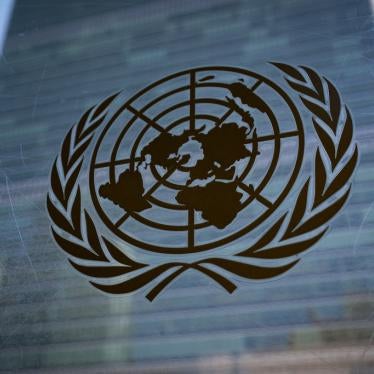We respectfully wish to draw to your attention to the reactions of the undersigned organizations to the recent report prepared by the Office of the High Commissioner for Human Rights (OHCHR), submitted in response to Commission decision 2004/116 considering the scope and legal status of existing initiatives and standards on the human rights’ responsibilities of transnational corporations.
We respectfully wish to draw to your attention to the reactions of the undersigned organizations to the recent report prepared by the Office of the High Commissioner for Human Rights (OHCHR), submitted in response to Commission decision 2004/116 considering the scope and legal status of existing initiatives and standards on the human rights’ responsibilities of transnational corporations. We feel that the OHCHR’s report, which we found balanced and constructive, makes a useful contribution to the discussion of the human rights responsibilities of companies. It offers some useful recommendations for consideration by the Commission on Human Rights about how to take forward this important initiative. The report is the outcome of the broad based consultations organized by the Office of the High Commissioner for Human Rights to which many governments, NGOs, businesses and trade unions contributed. They did so either by providing written submissions or by participating in the stakeholders’ meeting jointly organized with the Global Compact Office, in Geneva in October 2004.
The OHCHR report makes a positive contribution to advancing the international community’s understanding of the relationship between business and human rights. It clearly sets out the issues and it provides a succinct analysis of existing initiatives and standards, four of which are scrutinized in detail: the ILO Tripartite Declaration of Principles concerning Multinational Enterprises and Social Policy; the OECD Guidelines for Multinational Enterprises; the United Nations Global Compact; and the Norms on the Responsibilities of Transnational Corporations and Other Business Enterprises with regard to Human Rights. Given the large number and wide range of initiatives and standards relevant to corporate social responsibility the criteria that the report sets out for determining their scope and legal status are particularly valuable.
While the OHCHR report notes that the ILO Tripartite Declaration, the Global Compact and the OECD Guidelines refer to human rights we recall that none of them, for different reasons, offer a comprehensive perspective. The ILO Tripartite Declaration has a very specific focus on workers’ rights; the Global Compact is too general to offer adequate guidance; and the OECD Guidelines have geographical as well as procedural limitations. We share the OHCHR report’s view that as a result “there is a gap in understanding what the international community expects of business when it comes to human rights”. This is a gap that the UN Norms, as the most comprehensive, clear and complete text on business and human rights, attempts to bridge. The divergent views of those critical or supportive of the Norms have been presented in a balanced way in the report. This provides a useful starting point for further consultation aimed at understanding business responsibilities and identifying options for strengthening standards. In our view, these differences can best be addressed, and common ground found, through further dialogue and study. In this regard, we believe there are a number of initiatives currently underway that could make a valuable contribution to any future consideration by the Commission of Human Rights of these issues. These include research by NGOs using the Norms as a framework to identify the human rights responsibilities of companies and the Business Leaders’ Initiative on Human Rights, which is currently “road testing” the Norms with companies from different business sectors. The findings of these endeavors will only become available towards the end of 2006.
Crucially, in the “Outstanding Issues” section, the OHCHR report identifies areas that need further clarification, concerning fundamental concepts of corporate responsibility, including “complicity,” “spheres of influence,” and the protection of human rights in situations where “a State is unwilling or unable” to do so. We recognize that these issues and others merit further examination and discussion. We concur with the comment that “the clarification of responsibilities of business with regard to human rights could help prevent human rights problems from arising.”
We have given careful thought to the OHCHR report and consulted on it within our organizations and constituencies. We concur with a number of the report’s conclusions. Namely that:
- The responsibility of businesses with regard to human rights is a key issue on the agenda of the Commission on Human Rights.
- The Commission should act quickly to build on the positive momentum that has developed on this issue to define and clarify the human rights responsibilities of business entities.
- There are gaps in understanding the responsibilities of business with regard to human rights.
- There is a need to continue dialogue through the consultation process and expand it to incorporate additional voices.
- The further development of practical tools to help businesses implement their responsibilities should be encouraged.
- A number of key issues require separate study and clarification including the concepts of “complicity,” “spheres of influence,” and the protection of human rights where “a State is unwilling or unable” to do so.
- The U.N. Norms offer useful elements and should be maintained among existing initiatives and standards on business and human rights.
The OHCHR report will be discussed at the forthcoming session of the Commission on Human Rights. We hope that the Commission will reflect on it and decide to make further progress to address business and human rights issues. We would like to present for your delegation’s consideration some recommendations. Specifically, we jointly call on the Commission to:
- Keep business and human rights issues firmly on the agenda for the future, in order “to identify options for the strengthening of standards on the responsibilities of transnational corporations and related business enterprises with regard to human rights and possible means of implementation.” The process should build on the Norms.
- Continue the broad based consultations process it initiated and ensure wide participation from affected groups and stakeholders from all regions.
- Create an independent mechanism to study fundamental issues identified in the OHCHR report. For example, the Commission could call for the appointment of a special representative, special advisor, or independent expert of the Secretary-General on business and human rights. This person should be mandated to study fundamental issues, such as the concepts of “complicity” and “spheres of influence,” and identify existing human rights standards with regard to business and human rights as well as additional measures to address protection needs not adequately covered by existing instruments. Moreover, this person should be requested to engage in consultations and provide regular reports on progress in order to support an ongoing and constructive dialogue on the issue of business and human rights.
- Commit to review progress on an annual basis, beginning in 2006, in order to enhance standards of corporate accountability.
We reaffirm our commitment to work constructively with the U.N. Secretary-General, the High Commissioner for Human Rights, the Commission on Human Rights and other stakeholders to continue to study the relationship between business and human rights and to build consensus on how to address these complex issues.
Yours sincerely,
……
CC:
Secretary-General
High Commissioner for Human Rights
ORGANIZATION ENDORSEMENTS
1- Rights and Accountability in Development (RAID) [UK]
2- Amnesty International [UK (International)]
3- Human Rights Watch [USA (International)]
4- International Commission of Jurists [Switzerland (International)]
5- ESCR-Net Corporate Accountability Working Group [USA (International)]
6 - Plataforma Interamericana de Derechos Humanos, Democracia y Desarrollo [Brazil (Inter-American)]
7- Centro de Derechos Humanos y Medio Ambiente [Argentina]
8 - Women's Environment and Development Organizations [USA (International)]
9 - Habitat International Coalition [Chile (International)]
10 - Rights and Democracy [Canada (International)]
11- National Economic and Social Rights Initiative [USA]
12 - FORUM Menschenrechte-German Human Rights Forum [Germany]
13 - Fédération Internationale des Droits de l'Homme/ International Federation for Human Rights-FIDH [France (International)]
14 - Alliance for Holistic and Sustainable Development of Communities (AHSDC) [India]
15 - Justica Global (Global Justice Center) [Brazil]
16 - Environmental Health Fund & Health Care Without Harm [USA]
17 - EarthRights International [Thailand/USA]
18 - Association of Women's Rights in Development (AWID) [Canada, Mexico, South Africa]
19 - Human Rights Advocates [USA]
20 - PDHRE, Peoples Movement for Human Rights Learning [USA (International)]
21 - International Service for Human Rights (ISHR) [Switzerland]
22 - Casa Diritti Sociali-Roma [Italy]
23 - Greenpeace International [Netherlands (International)]
24 - FIAN-Belgium, FoodFirst Information and Action Network [Belgium]
25 - Franciscans International [Switzerland/USA]
26 - Terra de Direitos [Brazil]
27 - ActionAid UK [UK]
28 - Bill of Rights Defense Committee of Greater Dallas [USA]
29 - Asian Forum for Human Rights and Development (FORUM-ASIA) [Thailand (Regional)]
30 -Interfaith Center on Corporate Responsibility's Promoting Human Rights Working Group [USA]
31 - Eighth Day Center for Justice [USA]
32 - Danish Helsinki Committee for Human Rights [Denmark]
33 - IRENE-International Restructuring and Education Network Europe [Netherlands]
34 - Housing and Land Rights Network [Egypt]
35 - Korean House for International Solidarity (KHIS) [Republic of Korea]
36 - CREA: Center for Reflection, Education and Action [USA]
37 - Citizens for a Better Environment (CBE) [Zambia]
38 - Milieudefensie, Friends of the Earth Netherlands [Netherlands]
39 - Pax Christi Netherlands [Netherlands]
40 - Human Rights Council of Australia Inc. [Australia]
41 - FairFood [Netherlands]
42 - Portfolio Advisory Board-Adrian Dominican Sisters [USA]
43- The Maryknoll Fathers and Brothers [USA]
44 - Corporate Accountability International [USA]
45 - Sisters of St. Francis of Assisi [USA]
46 - Elizabeth Seton Federation [USA]
47 - MANI TESE [Italy]
48 - Dominican Sisters: Grand Rapids [USA]
49 - Child Justice League, Inc. [The Philippines]
50 - HOM-Humanistisch Overleg Mensenrechten/Humanist Committee on Human Rights [Netherlands]
51 - SOMO-Centre for Research on Multinational Corporations [Netherlands]
52 - Ursuline Sisters of Tildonk-U.S. Province [USA]
53 - Sisters of Mercy, Regional Community of Detroit [USA]
54 - Mercy Investment Program [USA]
55 - Dominican Sisters of Hope [USA]
56 - NJCM-Dutch section of the International Commission of Jurists [Netherlands]
57 - Centre for Environmental Research & Development Association Inc. (CERD) [Papua New Guinea]
58 - Capuchin Justice, Peace & Ecology Office [USA]
59 - National Council of Churches [USA]
60 - St. Walburg Monastery [USA]
61 - Sisters of Charity, BVM-West Region Team [USA]
62 - Witten Tenants Association/Tenants' Forum Ruhr Habitat-Net [Germany]
63 - Berne Declaration [Switzerland]
64 - CCFD, Comité Catholique contre la faim et pour le développement, French Catholic committee against hunger and for development [France]
65 - Sisters of the Holy Cross-Congregation Justice Committee-Notre Dame, IN [USA]
66 - Human Rights First [USA]
67 - International Alliance of Women [International]
68 - Centre for Organization, Research, and Education [India]
69 - Medical Mission Sisters [Belgium]
70 - Maryknoll Office for Global Concerns [USA]
71 - Mellemfolkeligt Samvirke (Danish Association for International Cooperation) [Denmark]
72 - RIRIKI Intervención Social [Mexico]
73 - Office of Peace and Justice, Sisters of St. Joseph, Nazareth, MI [USA]
74 - Save the Children Denmark [Denmark]
75 - Coastal Development Partnership [Bangladesh]
76 - AGEZ - Arbeitsgemeinschaft Entwicklungszusammenarbeit [Austria]
77 - Danish 92 Group - Danish Forum for Sustainable Development [Denmark]
78 - Foundation for Grassroots Initiatives in Africa (GrassRootsAfrica) [Ghana]
79 – Germanwatch [Germany]
80 - Sisters of St. Francis of Philadelphia [USA]
81 - International Baby Food Action Network (IBFAN) [International]
82 - Swiss Coalition of Development Organizations [Switzerland]
83 - Pro Natura - Friends of the Earth Switzerland [Switzerland]
84 - German Clean Clothes Campaign [Germany]
85 - Amnesty International, Swiss Section [Switzerland]
86 - Greenpeace Switzerland [Switzerland]
87 - Terre des Hommes Switzerland [Switzerland]
88 - ACAT Suisse [Switzerland]
89 - OMCT (Organisation Mondiale contre la Torture) [Switzerland]
90 - FTF - Funktionærernes og Tjenestemændenes Fællesråd/Salaried Employees' and Civil Servants Confederation [Denmark]
91 - HK/Denmark (Union of Commercial and Clerical Employees) [Denmark]
92 - Danish Nurses' Organization [Denmark]
93 - BUPL - The National Federation of Early Childhood Teachers and Youth Educators [Denmark]
94 - GES Investment Services [Sweden]
95 - Trillium Asset Management [USA]







